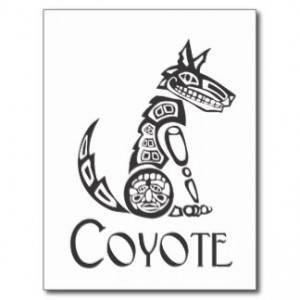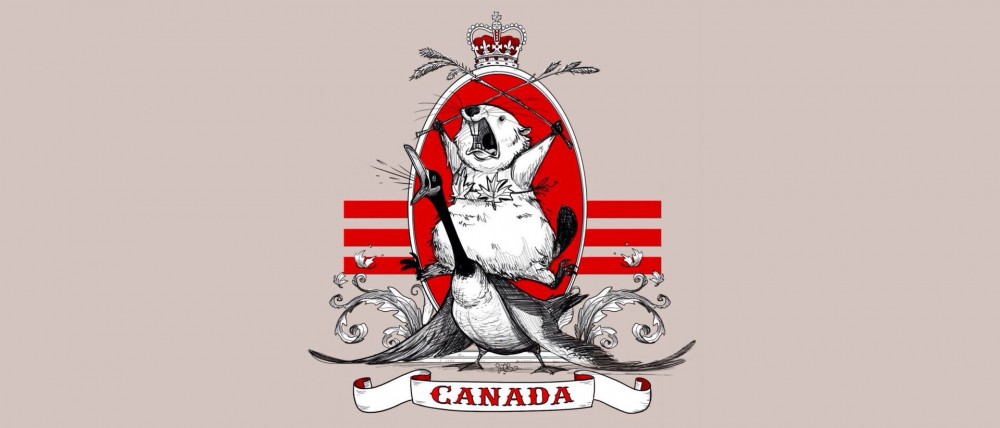Assignment 2.2 Question 5:
“If Europeans were not from the land of the dead, or the sky, alternative explanations which were consistent with indigenous cosmologies quickly developed” (“First Contact”43). Robinson gives us one of those alternative explanations in his stories about how Coyote’s twin brother stole the “written document” and when he denied stealing the paper, he was “banished to a distant land across a large body of water” (9). We are going to return to this story, but for now – what is your first response to this story? In context with our course theme of investigating intersections where story and literature meet, what do you make of this stolen piece of paper? This is an open-ended question and you should feel free to explore your first thoughts.
The creation story about Coyote and his twin brother fascinates me. The story, as recounted by Wendy Wickwire, perfectly explains how Europeans and First Nations people came to be on earth, and how we ended up living on different continents. To quickly summarize the series of events the two twins were the Earth’s first inhabitants (Wickwire). They were left in charge of various tasks, and the older brother completed them perfectly while the younger brother stole a “written document”(Wickwire) both twins were forbidden to touch. As a result the younger brother was banished to the land across the ocean with his piece of paper. The older twin stayed on the original land and became the “Indians’ forefather” while the banished twin is the original ancestor of white people. One last thing to note is that the white ancestor’s rule breaking made his descendants better at lying and rule breaking too.

My initial response to this story is that it perfectly explains how First Nations and Europeans came to be. I was genuinely impressed with how well this story explained the history of Native and European relations. With this story one can understand how these two different groups of people developed simultaneously in two separate lands with the inevitable outcome of meeting again. This creation story makes sense of where the Europeans came from and why “the white [man] can tell a lie more than the Indian…” (qtd. in Wickwire 10).
There are a lot of different elements going on in this story. One of the first things that stood out to me was that this story explains First Nations’ right to land ownership. Through the myth we see that the “Indians’ forefather” was given North America to make his home while the twin brother was banished to Europe. From the time man was created North America belonged to the “Indians”. Like Lutz says in his article, Myth Understandings: First Contact, Over and Over Again, contact stories legitimize land claims and this is exactly what Robinson’s story does (2). It clearly sets out to justify First Nations’ land claims and show that these claims are legitimate. Land claims are an issue that has been going on since Europeans arrived and First Nations people stand by their view that they are sovereign owners of the land. This creation story is another way to continue to legitimize their land claims.
Another interesting idea to explore is that this story explains why “white men” are liars and cheats to the “Indians”. When Robinson recounts this creation story to Wickwire he makes sure to emphasis that the stealing of the piece of paper by the Europeans’ ancestor causes white men to be liars. When Europeans arrived they were “true to their original character” (Wickwire 10) and began killing First Nations people and stealing their lands. The story demonstrates why Europeans committed the horrors they did to first Nations people when they arrived. I think a lot of comfort can be found when there is a logical explanation as to why someone (or a group) did what they did. Perhaps through this myth First nations people find comfort in the fact that the horrors they suffered can be explained by fate. White men were fated to commit the horrors they did because of their evil paper stealing ancestor. The myth explains the inexplicable.
In terms of where literature and story meet the stolen piece of paper in this story can represent many things. The first thing I think of is that the younger brother stole the written word or the knowledge necessary to write. If the story is interpreted this way it explains why First Nations people did not make written claims of their land. They couldn’t because the white man’s ancestor stole the knowledge of how to write. This interpretation would again justify land claims. Another thing I think of is that the settlers were paper pushers. European society wrote everything, just like we do today. We had the ability to write our history, to write down who owned what, and to write down our stories. Our culture values the written word so highly that we easily dismiss oral tradition as “myths” rather than histories just as true as our own written ones. The paper stolen by Coyote’s twin interjects literature right into an oral story.
Works Cited:
Assembly of First Nations. “Charter of Assembly of First Nationa.” Assembly of First Nations. Assembly of First Nations, Apr. 2003. Web. 18 Feb. 2016.
Lutz, John. “Contact Over and Over Again.” Myth and Memory: Rethinking Stories of Indignenous- European Contact. Ed. Lutz. Vancouver: U of British Columbia P, 2007. 1-15. Print.
Robinson, Harry. Living by Stories: a Journey of Landscape and Memory. Compiled and edited by Wendy Wickwire. Vancouver: Talon Books2005. (1-30)
Wonders, Dr. Karen. “Misrepresented.” First Nations. University of Goettingen, Nov. 2008. Web. 18 Feb. 2016.

Hey Nicole!
I really enjoyed reading your blog post. I especially appreciated the connection you made between this story and the First Nations’ rights to land ownership. I, too, upon reading this story made the same connection, and your elaboration of it was very well done. I think it is quite astonishing to consider the varying ways in which the First Nations people have tried to articulate their desired legitimization of their land claims — from the map they presented to McEachern to the contact stories recognized by Lutz; of course, while these are only two examples they validate the fact that their efforts to have their voices heard has been both ceaseless and admirable.
Furthermore, I am also intrigued by the point you make regarding the legitimization of actions that can derive from logical explanations. I agree with your point about how First Nations may find comfort in knowing that the horrors they endure have occurred throughout their ancestry. Of course, however, despite any sort of logical explanation that can be attributed, enduring torturous circumstances at any level, with or without the implication of fate, is always tragic.
Thank you again for your post! You proposed some great insights. 🙂
– Neia
(Sorry, disregard my previous comment!)
Hey Nicole!
I really enjoyed reading your blog post. I especially appreciated the connection you made between this story and the First Nations’ rights to land ownership. I, too, upon reading this story made the same connection, and your elaboration of it was very well done. I think it is quite astonishing to consider the varying ways in which the First Nations people have tried to articulate their desired legitimization of their land claims — from the map they presented to McEachern to the contact stories recognized by Lutz; of course, while these are only two examples they validate the fact that their efforts to have their voices heard has been both ceaseless and admirable.
Furthermore, I am also intrigued by the point you make regarding the legitimization of actions that can derive from logical explanations. I agree with your point about how First Nations may find comfort in knowing that the horrors they endure have occurred throughout their ancestry. Of course, however, despite any sort of logical explanation that can be attributed, enduring torturous circumstances at any level, with or without the implication of fate, is always tragic. If they really did derive an exponential amount of comfort from knowing that their situations were fated, it makes you realize just how strong of an impact the notion of destiny and preconceived outcomes must have had in their lives.
Thank you again for your post! You proposed some great insights. 🙂
– Neia
Hi Neia,
Thank you for the comment! I think you are right that we can see many ways in which First Nations people have tried to be heard regarding land claims. They have tried to adapt to what settlers consider legitimate (everything written down etc.) to justify their claims as much as possible. Yet despite their efforts I think we still have trouble listening to them, and I’m just not sure why we continue to ignore them over and over again. It perplexes me. Maybe its just easier not to change?
Thanks again for the comment!
Nicole